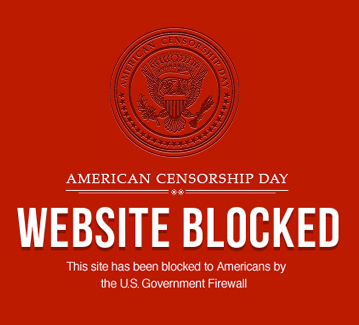The big news in the world today are the Stop Online Piracy Act (SOPA) and Protect IP Act (PIPA) which both are being developed in regards to online piracy and copyright infringement. Sounds simple? Well, right now they are two most controversial bills, much like the NDAA ,that also infringe on personal privacy and freedom, brought to you by, the US Senate floor. Thought be shelved and vetoed, they are back on the table for restructure and a possible vote later this year, read more here. Supported, as usual, by a combination of democratic and republican lobbyist, movie and music entertainment moguls, and some of the largest internet corporation such as GoDaddy.com, if these bills go through not only is the entire internet risking possible damage to it very core foundation, freedom of speech, but will also it undermine years innovation and integrity.
How will these bills work if implemented? That will be the catch. You see, it is all based on what is "deemed" as copyright infringement. Take the current Wikileaks for example, what if the US Government, or any government for that matter, decided to copyright sensitive, high-security information. The result would be, that under these bills, the US could have all links pointing to Wikileaks terminated, thus terminating the websites accessibility and rendering it useless. The scary thing is that this can be used in platforms such as Google, YouTube, Facebook, Reddit, Flickr, Twitter, etc—all platforms that were highly utilized by the Occupy Wall Street and Arab Spring movements. SOPA would not only institute the same practices as regimes such as China and Iran that outlaw the tools used by activists and thus circumventing censorship—Even scarier, take this out of the US/European agenda and put these types of bills in the hands of other countries. This possibility of a governments ability to squash dissent is appalling and completely unconstitutional in US politics as it goes against the First Amendment of the United States that says,
"Congress shall make no law respecting an establishment of religion, or prohibiting the free exercise thereof; or abridging the freedom of speech, or of the press; or the right of the people peaceably to assemble, and to petition the Government for a redress of grievances."
Thinks about the type of message this sends to the world. On TIME's Techland blog, Jerry Brito wrote,
"Imagine if the U.K. created a blacklist of American newspapers that its courts found violated celebrities' privacy? Or what if France blocked American sites it believed contained hate speech?" Similarly, the Center for Democracy and Technology warned, If SOPA and PIPA are enacted, the US government must be prepared for other governments to follow suit, in service to whatever social policies they believe are important—whether restricting hate speech, insults to public officials, or political dissent."
The only way a website will be able to declare immunity from this will be to voluntarily police their own sites and censor. All of this means that it will be harder to share information online. Bottomline!
Reporter/Activist Amy Goodman from Democracy Now reports:
http://www.democracynow.org/2012/1/17/wikipedia_reddit_to_shut_down_sites
Today, the Wikipedia community announced its decision to black out the English-language Wikipedia for 24 hours, worldwide, beginning at 05:00 UTC on Wednesday, January 18 (you can read the statement from the Wikimedia Foundation here). The blackout is a protest against proposed legislation in the United States — the Stop Online Piracy Act (SOPA) in the U.S. House of Representatives, and the PROTECT IP Act (PIPA) in the U.S. Senate — that, if passed, would seriously damage the free and open Internet, including Wikipedia.
—Mikolaj N. Bakunin

